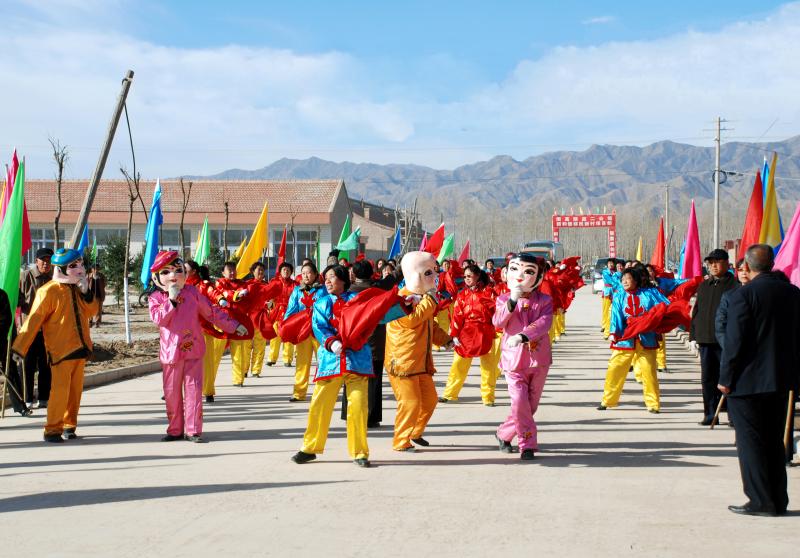UN Officials Hail China's Anti-poverty Efforts
China.org.cn/Chinagate.cn by Guo Xiaohong, Jiao Meng, Xu Lin and Jin Ling ,October 02, 2019 Adjust font size:
China has lifted more than 700 million people out of extreme poverty in the four decades since the country launched its reform and opening-up policy in the late 1970s, indicated by statistics from China’s State Council Leading Group Office of Poverty Alleviation and Development. China has committed to the goal of eradicating poverty entirely by 2020.

The Yangko team composed of people from the relocation village in the Xinhepu Town of Yanggao County, Shanxi Province.
China has received acclaim from around the world for its success and practice, which has contributed to over 70% of the global poverty reduction.
China’s sound political vision, scientific strategy and appropriate policies ensured its success in the war against poverty, commented Ashwani Muthoo, director of the Global Engagement, Knowledge and Strategy Division of the UN’s International Fund for Agricultural Development (IFAD), speaking at the 2017 International Seminar on Global Partnerships for Poverty Reduction held in Rome. He spoke highly of China for its theory and practice on targeted poverty reduction, saying, “China will provide inspiration to the cause of global poverty reduction.”
Muthoo’s view was echoed by Kundhavi Kadiresan, assistant director of the United Nations Food and Agriculture Organization (FAO) and regional representative for Asia and the Pacific, in an interview with China.org.cn in 2018.
“One important aspect is that China signals on rural importance,” Kadiresan said. “China’s No. 1 Central Document has laid special focus on agriculture for many consecutive years, a thing that other countries can learn,” she referred to a policy document released by the Central Committee of the Communist Party of China and the State Council. Kadiresan went on to say, “As poverty in the world is primarily rural, you need to give importance to agriculture. China has been able to alleviate poverty and solve the inequality problem by providing policy and actual support for rural development including technological innovation.”
Even more importantly, said Kadiresan, China has prioritized rural economic development while emphasizing pleasant living in rural areas by improving productivity and promoting green agriculture. “So, it’s not just having better incomes, but also the quality of life of rural people in the rural areas. The emphasis the country has given to that is actually a good point.”
Kadiresan explained that the FAO has a South-South partnership program with China, helping countries to look at opportunities to improve their productivity and potential for value chain development, as well as expand their markets and integrate innovation. “So the South-South helps countries in the region and beyond to learn from one another and more specifically, what China has gone through in terms of its transformation.”
Nick Beresford, Cambodia Office Country director of the United Nations Development Programme (UNDP), held that through the social protection program, China has tailored its approach to the village level, identifying, analyzing and assisting those trapped in poverty to rise out of it.
Speaking at the 11th ASEAN-China Forum on Social Development and Poverty Reduction, held in Cambodia in August 2017, Beresford suggested “not exactly replicating what is being done in one country, but rather sharing the central ideas in the correct context.” He added, “More targeted and effective policy solutions could be useful in Cambodia, a country of complicated geographical location and ethnicities.” China could offer these useful policy lessons to Cambodia, where the number of people living below the extreme poverty line accounts for 13 percent of Cambodia’s entire population, he said.
Sustainable development is everybody’s business, not just the government’s, noted Beresford. The goal encompasses the private sector, the community and civil society groups, and we should all have an open approach to ending poverty, he said.
“As a champion in the global poverty alleviation cause, China’s success serves as a good example for the rest of the world,” said Stanlake Samkange, senior director of Strategic Coordination and Support of the World Food Programme (WFP), at the Global Partnerships for Poverty Reduction international workshop, held in Rome in June 2018. “The WFP, IFAD and FAO are willing to continue working with China under the South-South Cooperation framework to promote the realization of the Sustainable Development Goals (SDG).”
At the workshop, Paul Winters, associate vice-president of the IFAD’s Strategy and Knowledge Department, underscored the potential of such partnership workshops to help meet the SDG and eradicate hunger and extreme poverty by 2030. China’s development and its cooperation with international poverty reduction organizations mean it can offer a wealth of knowledge, said Winters. “Partnership workshops provide a good opportunity for all the participants to share the results generated from the projects and efforts in poverty reduction and at the same time reflect on these results. We should think of the policy decisions and practices we have taken to achieve the results.”
“China’s continued efforts to address its remaining challenges and its model of inclusive development will continue to reduce the number of those living in poverty and help address the serious disparities between the rich and poor, rural and urban, and the coast and the interior,” said U.N. Secretary-General António Guterres in a message sent to the Global Poverty Reduction and Development Forum, held in Beijing in October 2017. Guterres held that targeted poverty reduction strategies are the only way to achieve the ambitious targets set out by the UN in their 2030 Agenda.
